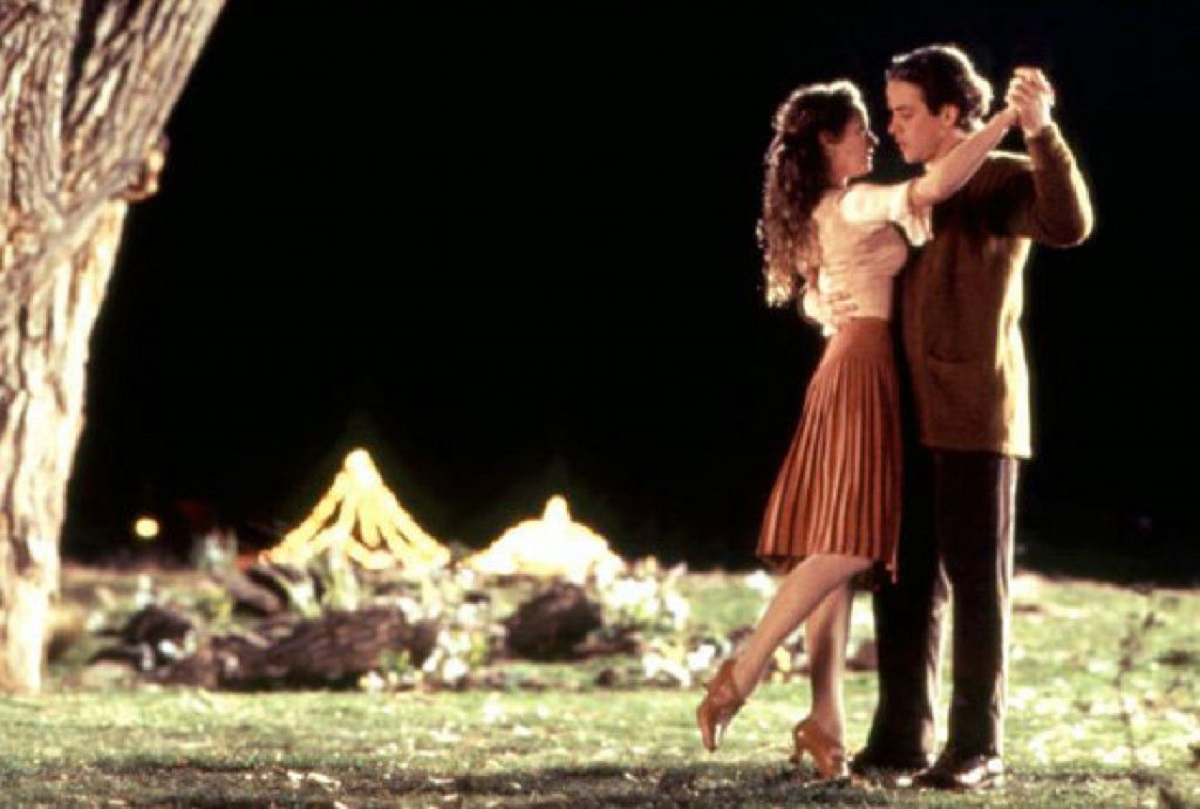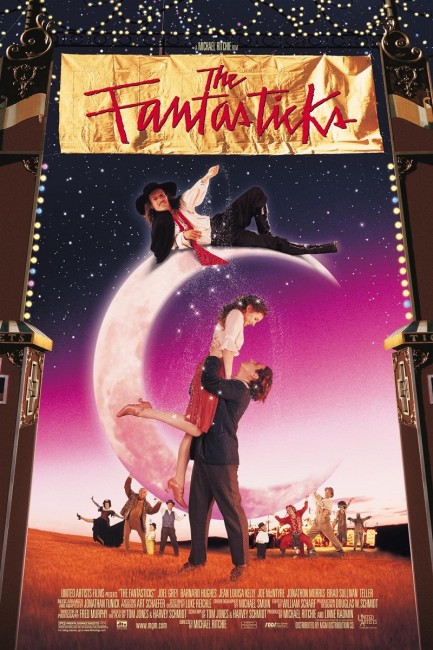Crew
Director – Michael Ritchie, Screenplay/Based on the Musical by Tom Jones & Harvey Schmidt, Producers – Linne Radmin & Michael Ritchie, Photography – Fred Murphy, Music Arranged/Adapted by Jonathan Tunick, Visual Effects – Boss Film Studio (Supervisor – Neil Krepela), Special Effects Supervisor – Cliff Wenger, Production Design – Douglas W. Schmidt, Choreography – Michael Smuin. Production Company – Michael Ritchie Productions/The Radmin Company/Sullivan Street Productions.
Cast
Jean Louisa Kelly (Luisa Bellamy), Joe McIntyre (Matt Hucklebee), Joel Grey (Amos Bellamy), Brad Sullivan (Ben Hucklebee), Jonathon Morris (El Gallo), Barnard Hughes (Henry Albertson), Teller (Mortimer)
Plot
The American Midwest during the 1920s. Neighbours Amos Bellamy and Ben Hucklebee have a bitter rivalry. Their respective children, Bellamy’s daughter Luisa and Hucklebee’s son Matt, are conducting a secret romance but keeping it hidden from their parents. Unknown to the children, the two parents are faking their rivalry in order to bring Matt and Luisa together in the hope that they will marry. A circus arrives in town. Bellamy and Hucklebee pay the circusmaster El Gallo to stage an abduction of Luisa so that Matt will come to her rescue. Matt does so but afterwards he and Luisa argue. Matt heads off determined to experience the world, while Luisa falls prey to El Gallo’s magical charms.
The Fantasticks is a musical that is one of the great Broadway sensations. Co-written by singer Tom Jones, the show premiered in 1960 and still plays today over five decades later. Contrarily though, this film version of the musical could be politely considered a flop. First produced in 1994, the film remained on studio shelves and unseen outside of previews until 2000. It would probably have remained that way excepting for the efforts of Francis Ford Coppola who took over editing and ended up severely cutting it, including dumping three songs. It was finally dumped into a handful of cinemas and went entirely unseen.
It is hard to think of something that sits at almost entirely opposing remove from the success of its source of inspiration. It is probable that the reasons for this were something to do with the two different audiences for either. Broadway musicals are usually enjoyed by people in their fifties and upwards, whereas the cinematic audience for the musical was at its peak during the 1960s with efforts like West Side Story (1961), My Fair Lady (1964) and The Sound of Music (1965) and underwent a drastic decline during the 1970s. The musical is almost an unknown genre in the late 1970s and beyond – excepting perhaps genre-busting efforts like The Rocky Horror Picture Show (1975) and Little Shop of Horrors (1986) and the occasional successes of more recent efforts such as Chicago (2002) and Mamma Mia (2008).
The Fantasticks had the misfortune to end up in the hands of director Michael Ritchie. Ritchie saw some success in the 1970s with films like Downhill Racer (1969), The Candidate (1972) and Prime Cut (1972). However, whenever he has attempted to touch fantasy material – as in the cases of the modern pirates of the Caribbean film The Island (1980), the disastrous Eddie Murphy fantasy The Golden Child (1986) and the children’s film A Simple Wish (1997) – Ritchie only churned out flops. He died the year after The Fantasticks finally saw cinematic release.

I have never seen the stage version of The Fantasticks and am not a particular fan of the musical as a genre. A large part of the problem that those who were fans had with the film adaptation is its interpretation of the material. The musical was designed as a minimalist Broadway show – it has no sets, all the magic that is supposedly conjured comes from the audience’s imagination and via what the characters describe to us. This is impossible to duplicate on film – unless maybe you want to take the route of something like Lars von Trier’s Dogville (2003) – and so in the film the minimalist effect have been replaced by sets and things that are seen rather than left to the imagination.
Part of the problem that the producers of The Fantasticks failed to see when it came to the film version was simply that the audience for the film were no longer there. The predominantly youth audience of the 2000s had no interest in the Broadway musical. The film trades in simplistic, old-fashioned feelgood sentiments and an almost manic larger-than-life optimism – the two old fogeys bring their two children together into one another’s arms beneath their pretend rivalry; the two lovers split up; he goes on a pretend drugged journey, while she nearly falls prey to the sinisterly charismatic circus master; everything works out for the best at the end. It is a film where you sit almost entirely indifferent to either the drama or the feelgood sentiment the music tries to create. The cast are variable, although the often greatly underrated Barnard Hughes shines in the role of a bad ham performer.
It is also hard to think what was going through Michael Ritchie’s head during some of the scenes. For the musical’s minimalism, he replaces a tatty sense of carnival sideshow that comes with the threads clearly and obviously showing. Ritchie almost seems to be deflating any pretensions to magic or flight of fantasy and the film plays out in a way that is deliberately lacking in any magic. The abduction scene features absurd pieces with Jean Louis Kelly tied to a knife-thrower’s wheel, sword duels, shallow dives, a sphinx and Jonathon Morris’s El Gallo seeming to be ‘conducting’ the action from the lines. It goes on and on – particularly during the sideshow tour of India and Venice – in a way that only leaves you wondering what it is all about much of the time.


